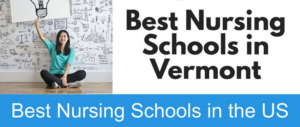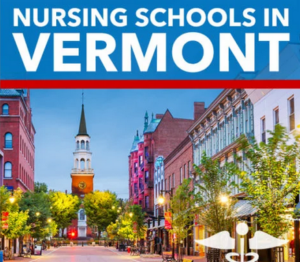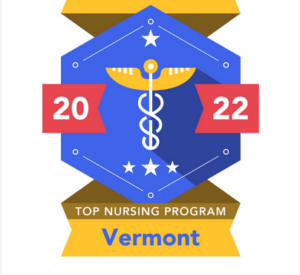The Top Nursing Schools in Vermont
 Vermont is home to a variety of nursing schools offering programs designed to prepare students for rewarding careers in healthcare.
Vermont is home to a variety of nursing schools offering programs designed to prepare students for rewarding careers in healthcare.
Whether you’re interested in a Bachelor of Science in Nursing (BSN) or an Associate Degree in Nursing (ADN), you’ll find options with high NCLEX pass rates and accredited nursing programs in Vermont that ensure you meet the nursing licensure requirements in Vermont.
This guide highlights the best nursing schools in Vermont, providing valuable insights to help you make an informed decision about which program aligns best with your career goals and educational needs.
The Best Nursing Schools in Vermont
Vermont may be a smaller state, but it offers several quality nursing schools. Among the top options, you’ll find both ADN nursing programs in Vermont that typically take two years to complete and BSN nursing programs in Vermont that span four years. Both types of programs are designed to prepare students for the NCLEX-RN, which is required for nursing licensure in Vermont.

Struggling to meet your deadline?
Get your assignment on The Top Nursing Schools in Vermont done by certified MDs and PhDs in the USA. ORDER NOW!
Here are some of the most renowned nursing schools in Vermont, offering a range of degrees and flexible study options, including online nursing programs in Vermont for those who prefer distance learning.
The Best Nursing Schools in Vermont
The Best Nursing Schools in Vermont
- University of Vermont College of Nursing and Health Sciences
- Location: Burlington, VT
- Website: https://www.uvm.edu/nursing
- Description: The University of Vermont (UVM) College of Nursing and Health Sciences is widely regarded as the best nursing school in Vermont. UVM offers a comprehensive nursing education through its Bachelor of Science in Nursing (BSN), Master of Science in Nursing (MSN), Doctor of Nursing Practice (DNP), and Ph.D. in Nursing programs. The BSN program provides students with a strong clinical foundation, advanced nursing theory, and leadership development, preparing them to sit for the NCLEX-RN and embark on successful nursing careers.

The MSN program offers specialized tracks such as Family Nurse Practitioner (FNP) and Nurse Anesthesia, while the DNP and Ph.D. programs are designed for nurses seeking to advance their practice or enter the academic and research arenas. UVM is known for its commitment to evidence-based practice, healthcare innovation, and rural health, providing students with hands-on clinical experiences at the UVM Medical Group and other healthcare institutions across the state. The college’s strong focus on patient-centered care and leadership makes it an excellent choice for students seeking to make a lasting impact on healthcare in Vermont and beyond. - Accreditation: CCNE
- Tuition: Approx. $19,000 per year (undergraduate, in-state)
- Programs: BSN, MSN, DNP, Ph.D. in Nursing
- Specializations: Family Nurse Practitioner, Nurse Anesthesia, Nurse Educator
- Castleton University Nursing Program
- Location: Castleton, VT
- Website: https://www.castleton.edu
- Description: Castleton University offers one of the top Bachelor of Science in Nursing (BSN) programs in Vermont. Known for its intimate, personalized learning environment, Castleton provides nursing students with strong academic training, clinical experiences, and leadership development. The BSN program emphasizes evidence-based practice, patient-centered care, and clinical competence, preparing graduates for the NCLEX-RN exam and a successful career in nursing.
The program is designed to equip students with the skills to deliver compassionate, high-quality care in a variety of healthcare settings. Castleton University partners with leading healthcare institutions in Vermont, providing students with clinical placements that offer real-world experience in diverse patient care environments. The program’s small class sizes allow for individualized instruction and mentorship from experienced faculty members. Castleton’s nursing students also benefit from strong community service opportunities, allowing them to gain experience in healthcare outreach and public health initiatives. - Accreditation: CCNE
- Tuition: Approx. $12,000 per year (undergraduate, in-state)
- Programs: BSN
- Specializations: Registered Nurse
- Vermont Technical College Nursing Program
- Location: Randolph Center, VT
- Website: https://www.vtc.edu
- Description: Vermont Technical College (VTC) offers an Associate of Science in Nursing (ASN) program designed for students who want to quickly enter the nursing workforce. The ASN program prepares students for the NCLEX-RN exam and entry-level nursing roles in a variety of clinical settings. Students receive a strong foundation in nursing theory and clinical practice through classroom instruction and hands-on clinical experiences at local healthcare institutions.
VTC’s nursing program focuses on developing clinical skills, ethical patient care, and leadership qualities, ensuring that graduates are well-prepared to provide high-quality care in diverse healthcare environments. VTC’s faculty are experienced professionals who offer personalized support to ensure student success. In addition to the ASN program, VTC offers an RN-to-BSN pathway, allowing registered nurses to further their education and career prospects. VTC’s affordable tuition, strong clinical placements, and commitment to nursing excellence make it a great choice for students seeking to become registered nurses. - Accreditation: ACEN
- Tuition: Approx. $7,500 per year (in-state)
- Programs: ASN, RN-to-BSN
- Specializations: Registered Nurse
- Northern Vermont University Nursing Program
- Location: Johnson, VT
- Website: https://www.nv.edu
- Description: Northern Vermont University (NVU) offers a Bachelor of Science in Nursing (BSN) program designed to prepare students for the demands of modern healthcare. The BSN program integrates clinical practice, nursing theory, and leadership training, giving students the skills necessary to provide excellent patient care. NVU emphasizes small class sizes and individualized instruction, which fosters a supportive learning environment where students can thrive.
The program offers extensive clinical placements across Vermont, providing students with the opportunity to gain hands-on experience in diverse healthcare settings. NVU’s nursing program focuses on community health, ethical patient care, and evidence-based practice, ensuring that graduates are ready to meet the healthcare needs of the local population. With a focus on sustainability and rural healthcare, NVU is an excellent choice for students who want to make a difference in the healthcare field. - Accreditation: CCNE
- Tuition: Approx. $12,000 per year (in-state)
- Programs: BSN
- Specializations: Registered Nurse

- Community College of Vermont Nursing Program
- Location: Multiple locations across Vermont
- Website: https://www.ccv.edu
- Description: The Community College of Vermont (CCV) offers an affordable and flexible Associate of Science in Nursing (ASN) program that prepares students to become registered nurses. The ASN program provides a strong foundation in nursing practice, combining classroom instruction with clinical experiences at local healthcare facilities. Students have the opportunity to work with patients in a variety of settings, gaining real-world experience in delivering compassionate and effective care.
CCV’s faculty are dedicated to supporting students through their educational journey, offering mentorship and guidance to help them succeed. The program is designed for students who wish to complete their nursing education quickly and enter the workforce as licensed RNs. In addition to the ASN program, CCV offers an RN-to-BSN completion program for registered nurses who want to further their education and expand their career opportunities. With its affordable tuition and commitment to student success, CCV is an excellent choice for aspiring nurses in Vermont. - Accreditation: ACEN
- Tuition: Approx. $6,000 per year (in-state)
- Programs: ASN, RN-to-BSN
- Specializations: Registered Nurse
- Middlebury College Pre-Nursing Program
- Location: Middlebury, VT
- Website: https://www.middlebury.edu
- Description: Middlebury College does not offer a direct nursing degree, but its pre-nursing track is a great option for students planning to pursue nursing at the graduate level. The pre-nursing program provides a rigorous foundation in the sciences, including courses in biology, chemistry, and anatomy, preparing students to apply to nursing graduate programs.
Middlebury’s emphasis on liberal arts education ensures that students not only develop the technical knowledge required for nursing but also critical thinking, leadership, and communication skills. Students in the pre-nursing track can seek clinical experience through internships and volunteer opportunities in local healthcare settings. Middlebury’s strong academic reputation and its commitment to sustainability, diversity, and social responsibility make it an excellent choice for students looking to pursue a career in nursing through a graduate program. - Accreditation: N/A (Pre-Nursing Track)
- Tuition: Approx. $58,000 per year (undergraduate)
- Programs: Pre-Nursing Track
- Specializations: Pre-Nursing
These nursing schools in Vermont offer a variety of options for students at different stages of their nursing education. Whether you’re looking to earn your BSN, ASN, or pursue advanced practice roles through graduate programs, Vermont’s nursing schools provide high-quality, hands-on education that prepares graduates for successful careers in nursing.
The Best Nursing Schools in Vermont
Key Considerations When Choosing a Nursing School in Vermont
When selecting a nursing program in Vermont, it’s important to look at several factors:
- NCLEX Pass Rates: A high NCLEX pass rate is a good indicator of how well a school prepares its students for the licensure exam. In Vermont, many nursing schools boast above-average NCLEX pass rates.
- Accreditation: Ensure that the school is accredited, as this affects the quality of education and your eligibility for federal financial aid.
- Cost and Financial Aid: The cost of tuition can vary widely, so check for available scholarships, grants, or work-study opportunities to reduce your financial burden.
- Clinical Placements: Especially for online nursing programs in Vermont, make sure the school can help arrange local clinical placements for hands-on experience.
Accredited programs are critical because they meet national education standards, ensuring you’re well-prepared for the nursing profession and nursing licensure in Vermont.
How to Choose a Nursing Program in Vermont
Choosing the right nursing program requires balancing multiple factors:
- Program Type: Decide whether an ADN or BSN is right for you. An ADN takes less time and is more affordable, but a BSN often opens doors for more advanced nursing roles and higher earning potential. Both will prepare you for the NCLEX-RN and nursing licensure in Vermont.
- NCLEX Pass Rates: Research the NCLEX pass rates in Vermont to assess how well schools prepare students for the exam. Schools with higher pass rates often offer better training and support for students.
- Clinical Experience: Make sure that the program includes hands-on clinical hours in real healthcare settings. For online nursing programs in Vermont, check if local clinical placements are available.
- Program Flexibility: If you need a flexible schedule, consider an online RN to BSN program in Vermont that can be done part-time or full-time.
Why Become a Nurse in Vermont?
Vermont is an ideal place to pursue a nursing career due to several factors:
- Nursing Licensure Compact (NLC): Vermont is part of the Nurse Licensure Compact, meaning that if you earn your nursing license in Vermont, you can practice in other NLC member states without needing additional licensure.
- High Quality of Life: Vermont offers a unique lifestyle with beautiful landscapes, outdoor activities year-round, and a sense of community that makes it a great place to live and work.
- Nursing Job Opportunities: Vermont has a growing demand for nurses, with many nursing job opportunities in Vermont due to an aging population and the need for healthcare services.
- Workplace Transparency: Vermont requires hospitals to disclose nurse-staffing ratios, which gives nurses insight into working conditions and patient care standards.
Salary and Job Outlook for Nurses in Vermont
Understanding nursing salaries in Vermont is an important factor when considering your career. While the average salary for registered nurses in Vermont is lower than the national average, the state offers a relatively low cost of living compared to many other regions.
- Average Salary for Nurses in Vermont: According to the U.S. Bureau of Labor Statistics (BLS), the average salary for registered nurses (RNs) in Vermont is approximately $72,140, compared to the national average of $82,750. Nurse practitioners (NPs) in Vermont earn an average of $108,280.
- Job Growth: The nursing job growth rate in Vermont is expected to be slightly slower than the national rate, but with more than 2,600 new RN job openings projected by 2023, there will still be a steady demand for nurses. The nursing job market in Vermont is stable, with nursing job growth in Vermont projected to increase due to retirements and workforce turnover.
Highest-Paying Cities for Nurses in Vermont
If you’re looking to maximize your income as a nurse in Vermont, the following cities offer the highest salaries for nurses:
- Burlington – South Burlington: The median salary for registered nurses in Burlington is around $72,360, which is higher than the state average.
Steps to Becoming a Nurse in Vermont
Here’s a simplified step-by-step guide to becoming a nurse in Vermont:
- Graduate from an Accredited Nursing Program: Complete either an ADN nursing program in Vermont or a BSN nursing program in Vermont.
- Pass the NCLEX-RN: After graduation, you must pass the NCLEX-RN exam to become a licensed registered nurse in Vermont.
- Complete a Criminal Background Check: Submit to a background check as part of the licensing process.
- Apply for Licensure: Apply through the Vermont Board of Nursing and pay the $60 application fee. If you’re an out-of-state graduate, make sure your transcripts are sent to the board.
For advanced practice registered nurses (APRNs), the process includes earning a master’s degree in nursing and completing additional licensure steps.
Frequently Asked Questions About Nursing in Vermont
1. How much do nurses make in Vermont?
The average salary for registered nurses in Vermont is $72,140. For more experienced RNs, salaries can rise to over $100,000, depending on the location and years of service.
2. Are nurses in demand in Vermont?
Yes, Vermont is experiencing a demand for nurses. Over 2,600 new RN job openings are expected between 2021 and 2023 due to retirements and an aging population.
3. How long does it take to become an RN in Vermont?
It typically takes two years to complete an ADN and four years for a BSN. After graduation, passing the NCLEX-RN exam and completing licensing steps typically takes a few weeks.
4. How do I get a nursing license in Vermont?
To become a nurse in Vermont, you must complete an accredited nursing program, pass the NCLEX-RN, and apply to the Vermont Board of Nursing. If you hold a nursing license from another state, you can apply for licensure by endorsement through the Nurse Licensure Compact.
By carefully choosing the right program and following the steps to nursing licensure in Vermont, you can embark on a fulfilling career in the nursing field. Whether you pursue online nursing programs in Vermont, a traditional BSN or ADN, or advanced nursing education, Vermont offers a wide range of opportunities for aspiring nurses.

Dont wait until the last minute.
Provide your requirements and let our native nursing writers deliver your assignments ASAP.

